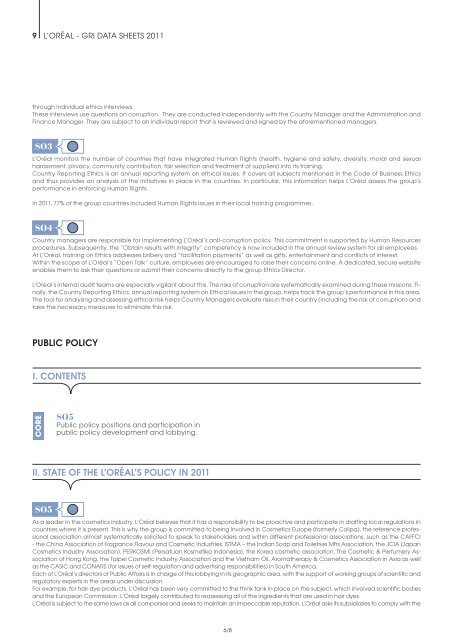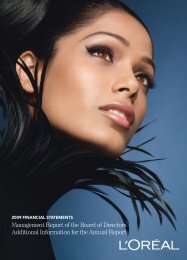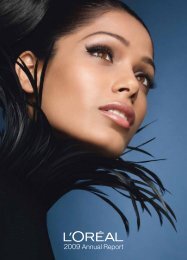Organizational Strategy - Sustainable Development - L'Oréal
Organizational Strategy - Sustainable Development - L'Oréal
Organizational Strategy - Sustainable Development - L'Oréal
You also want an ePaper? Increase the reach of your titles
YUMPU automatically turns print PDFs into web optimized ePapers that Google loves.
9 L’OréaL - GrI DaTa SHEETS 2011<br />
through individual ethics interviews.<br />
These interviews use questions on corruption. They are conducted independently with the Country Manager and the administration and<br />
Finance Manager. They are subject to an individual report that is reviewed and signed by the aforementioned managers.<br />
SO3<br />
L’Oréal monitors the number of countries that have integrated Human rights (health, hygiene and safety, diversity, moral and sexual<br />
harassment, privacy, community contribution, fair selection and treatment of suppliers) into its training.<br />
Country reporting Ethics is an annual reporting system on ethical issues. It covers all subjects mentioned in the Code of Business Ethics<br />
and thus provides an analysis of the initiatives in place in the countries. In particular, this information helps L’Oréal assess the group’s<br />
performance in enforcing Human rights.<br />
In 2011, 77% of the group countries included Human rights issues in their local training programmes.<br />
SO4<br />
Country managers are responsible for implementing L’Oréal’s anti-corruption policy. This commitment is supported by Human resources<br />
procedures. Subsequently, the “Obtain results with integrity” competency is now included in the annual review system for all employees.<br />
at L’Oréal, training on Ethics addresses bribery and “facilitation payments” as well as gifts, entertainment and conflicts of interest.<br />
Within the scope of L’Oréal’s “Open Talk” culture, employees are encouraged to raise their concerns online. a dedicated, secure website<br />
enables them to ask their questions or submit their concerns directly to the group Ethics Director.<br />
L’Oréal’s internal audit teams are especially vigilant about this. The risks of corruption are systematically examined during these missions. Finally,<br />
the Country reporting Ethics, annual reporting system on Ethical issues in the group, helps track the group’s performance in this area.<br />
The tool for analysing and assessing ethical risk helps Country Managers evaluate risks in their country (including the risk of corruption) and<br />
take the necessary measures to eliminate this risk.<br />
PuBLIC POLICY<br />
I. CONTENTS<br />
CORE<br />
SO5<br />
Public policy positions and participation in<br />
public policy development and lobbying.<br />
II. STATE OF THE L’ORÉAL’S POLICY IN 2011<br />
SO5<br />
as a leader in the cosmetics industry, L’Oréal believes that it has a responsibility to be proactive and participate in drafting local regulations in<br />
countries where it is present. This is why the group is committed to being involved in Cosmetics Europe (formerly Colipa), the reference professional<br />
association almost systematically solicited to speak to stakeholders and within different professional associations, such as the CaFFCI<br />
- the China association of Fragrance Flavour and Cosmetic Industries, ISTMa – the Indian Soap and Toiletries Mfrs association, the JCIa (Japan<br />
Cosmetics Industry association), PErKOSMI (Persatuan Kosmetika Indonesia), the Korea cosmetic association, The Cosmetic & Perfumery association<br />
of Hong Kong, the Taipei Cosmetic Industry association and the Vietnam Oil, aromatherapy & Cosmetics association in asia as well<br />
as the CaSIC and CONarS (for issues of self-regulation and advertising responsibilities) in South america.<br />
Each of L’Oréal’s directors of Public affairs is in charge of this lobbying in its geographic area, with the support of working groups of scientific and<br />
regulatory experts in the areas under discussion.<br />
For example, for hair dye products, L’Oréal has been very committed to the think tank in place on the subject, which involved scientific bodies<br />
and the European Commission. L’Oréal largely contributed to reassessing all of the ingredients that are used in hair dyes.<br />
L’Oréal is subject to the same laws as all companies and seeks to maintain an impeccable reputation. L’Oréal asks its subsidiaries to comply with the<br />
6/8






